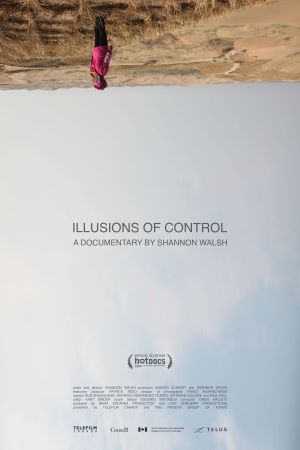
Illusions of Control 2019
Distributed by Good Docs
Produced by Andréa Schmidt and Shannon Walsh
Directed by Shannon Walsh
Streaming, 87 mins
College - General Adult
Ethics; Grief; Mental health
Date Entered: 03/05/2024
Reviewed by Kristan Majors, Woodruff Library, Emory UniversityIllusions of Control is about grief, anxiety, optimism, and hardship. The film captures the personal lives of parents searching for their adult children in mass graves, citizens forced to relocate their homes and livelihoods, the everyday realities of living with environmental destruction, and a cancer patient navigating their diagnosis. Viewers could define the film as a study of women’s resilience as it does follow five women and, in fact, some libraries have cataloged the film as such. Yet, the film captures experiences of community members, friends, and family members, so this film is not limited to women’s studies. Others have identified this as an environmental film, but it is not. The environment is only one of the many examples that causes harm (and offers hope) in this film. The filmmakers describe this film as a “meditation on resilience in the face of disaster,” which is the best description. The filming is beautiful, hopeful, and truly artistic.
Unfortunately, it is not a film easily adapted for a college or university classroom. Viewers are required to watch the entire documentary as the film jumps around to all 5 stories regularly. This makes it difficult to use in a class needing a shorter viewing time or hoping to follow a single theme. Instructors should note they will need to allot more time for discussing this film perhaps adding supplemental readings and/or presentations because the film does not include narration, or commentary from mental health staff, faith leaders, or related professionals on the themes. Good Docs states closed captions are not included for the English language portions, which also makes it difficult for in-class use when notetaking is needed. The streaming prices for university and college libraries for this documentary are very expensive. The emotional subject matter and meditative style is best viewed with friends, a community group, or as a part of a film series. In summary, this film is more appropriate and affordable for individuals, community groups, or public libraries.
For those seeking an environmental documentary about resilience, then I recommend How to Let Go of the World And Love all the Things Climate Can’t Change and Inhabitants For other subjects, search “resilience” in EMRO.
Awards: Calgary International Film Festival, Honourable Mention Best Canadian Documentary Award
Published and licensed under the Creative Commons Attribution 4.0 license. Anyone can use these reviews, so long as they comply with the terms of the license.